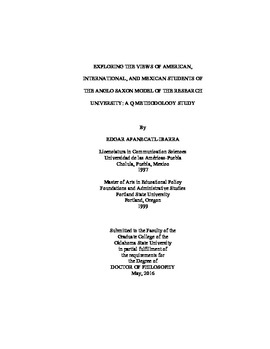| dc.contributor.advisor | Wanger, Stephen P. | |
| dc.contributor.author | Apanecatl-Ibarra, Edgar | |
| dc.date.accessioned | 2017-02-22T22:08:17Z | |
| dc.date.available | 2017-02-22T22:08:17Z | |
| dc.date.issued | 2016-05 | |
| dc.identifier.uri | https://hdl.handle.net/11244/48777 | |
| dc.description.abstract | The purpose of this Q methodological study was to explore the views of three groups of graduate students concerning the Anglo Saxon model of the research university. A review of relevant literature revealed that current global competition among higher education institutions has pushed universities to look for successful models in order to position themselves in the local, national, and global markets. In that context, the key elements or characteristics of Anglo Saxon research universities are increasingly being adopted, completely or partially, by non-Anglo Saxon institutions. The review of the literature revealed that students' views of the key elements have neither been explored nor considered in the adoption/adaptation processes. This study explored students' subjective values of six key elements of the model. Five elements were those included in the emerging model proposed by Wanger, Azizova and Wang (2009) and Wang and Wanger (2011). An additional element, recurrent in the review of literature, was added for its empirical exploration. The review of the discourse, in the literature and online, on the Anglo Saxon model of the research university served to construct a 36 statement Q set that was sorted twice by 60 graduate students (20 American, 20 Mexican, and 20 international students). Demographic information was collected including age, gender, ethnicity, and years in current academic program. Analysis of the results was conducted with the use of PQMethod software. Volunteer post-sorting interviews helped inform the discussion of the results. A first-order factor analysis was conducted to describe the views within each group. A second-order factor analysis was conducted to determine how the within group views aligned across the three groups. A three factor solution was interpreted to be knowledge driven, money driven, and scholarly driven. Findings suggested that knowledge driven students value graduate education primarily for the sake of knowledge; that money driven students value graduate education mostly in terms of economic advancement; and that scholarly driven students value graduate education with regards to research. | |
| dc.format | application/pdf | |
| dc.language | en_US | |
| dc.rights | Copyright is held by the author who has granted the Oklahoma State University Library the non-exclusive right to share this material in its institutional repository. Contact Digital Library Services at lib-dls@okstate.edu or 405-744-9161 for the permission policy on the use, reproduction or distribution of this material. | |
| dc.title | Exploring the views of American, international, and Mexican students of the Anglo Saxon model of the research university: A Q methodology study | |
| dc.contributor.committeeMember | Kearney, Kerri S. | |
| dc.contributor.committeeMember | Blum, Denise F. | |
| dc.contributor.committeeMember | Perkins, Stephen M. | |
| osu.filename | ApanecatlIbarra_okstate_0664D_14661.pdf | |
| osu.accesstype | Open Access | |
| dc.type.genre | Dissertation | |
| dc.type.material | Text | |
| thesis.degree.discipline | Educational Leadership and Policy Studies | |
| thesis.degree.grantor | Oklahoma State University | |
